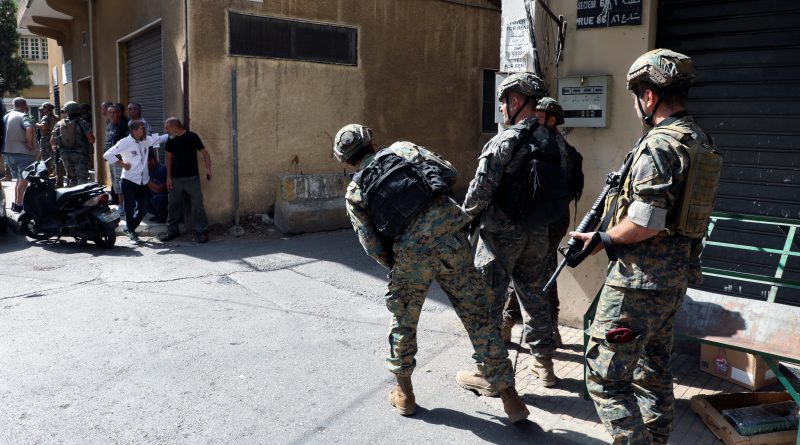Civil Unrest in Beirut
How the Beirut port explosion evoked haunting echoes of Lebanon’s civil war.
Key Actors:
- Hezbollah; Lebanese Shia Islamist political party, militant group
- Amal Movement; Lebanese political party, former militia affiliated with the Shia sect
- Lebanese Forces (LF); Lebanese Christian-based political party, former militia during the Lebanese Civil War
- Judge Tarek Bitar; Lebanese judge and head of Beirut’s criminal court
Haunted by the Past
The scenes of bloodshed on the streets of Beirut are a grim reminder of Lebanon’s 15-year civil war. The term civil war has once again entered Lebanese political discourse. Beirut’s current civil unrest is by no means an instantaneous issue; it is the amalgamation of a long-running probe into the Port of Beirut explosion that occurred on August 4, 2020. After being confiscated by the Lebanese Forces from the abandoned ship MV Rhosus, 2750 tonnes of ammonium nitrate had been stored in a warehouse without appropriate safety measures for six years. The notorious explosion was preceded by a fire in the same warehouse, though the exact cause of the detonation is still under investigation as of September 2021. In mere seconds, the explosion punched through buildings for kilometers around, collapsed homes, and scattered streets with debris and dust. The blast killed more than 190 people, injured 6000, and cost billions of dollars in damage.
The outburst of violence is a result of underlying tensions between Lebanon’s sectarian divides and pushback against the port investigation by the two main Shiite Muslim parties; the Hezbollah militant group and its allied Amal Movement. Judge Tarek Bitar is leading the investigation but has received consistent pushback from Hezbollah and its allies. “They accuse him of only targeting people from a certain political line, and we’re starting to hear…statements accusing him of standing against the Resistance, against Hezbollah, standing with the Americans, standing with the Western nation,” said Halim Shebaya, executive director at the Arab Association of Constitutional Law in Lebanon.
A Deadly, Divisive Protest
Violence broke out on October 14, 2021 at a Beirut protest organised by Hezbollah and the Amal Movement which called for the removal of Judge Tarek Bitar. The two Shiite groups and the Lebanese Forces were armed. Gunmen were battling one another for several hours with automatic rifles and rocket-propelled grenades.
The two Shiite groups accused the Lebanese Forces of initiating the shooting, but the Lebanese Forces denied the accusation. It is unclear who fired the first shot, but the confrontation quickly escalated into exchanges of gunfire along the “Green Line”: a former civil war front line separating predominantly Muslim and Christian areas of Beirut. “We will not be pulled into civil war, but we will also not allow the blood that was shed to go in vain,” senior Hezbollah official Hashem Safieddine said during a post-protest funeral. He accused the Lebanese Forces of committing a “massacre.”
The Lebanese Forces have denied Hezbollah claims that the LF’s opposition was an “unprovoked assault on protestors.”. “We believe . . . Hezbollah was the victim of its own excess of power,” said Marc Saad, LF spokesperson. “Of course, we are opposing Hezbollah’s clandestine acts in the street against a judge who is doing his job.”
Casualties
The death toll rose to seven on October 15, 2021, with the Lebanese Red Cross stating at least 30 were wounded. The dead included two fighters from Hezbollah and three from Amal. Among the deaths was Mariam Farhat; a mother of five. Farhat was shot by a sniper as she sat near the balcony door of her second floor apartment. She was laid to rest in the Hezbollah ceremony in south Beirut, along with the two Hezbollah fighters. Her casket was draped with a Hezbollah flag.
What does this mean for Beirut’s future?
The protest’s aftermath has evoked memories of Lebanon’s civil war, as schools, banks and government offices across Lebanon shut down for a day of mourning on October 15, 2021. Funerals were held in several parts of the country, and a separate funeral was held for an Amal fighter in Southern Beirut. The gun battle will likely increase preexisting social and political tensions between Christians and Muslims in Beirut.
A senior Hezbollah official, Mohammed Daamoush, said in a sermon during Friday prayers that the group will keep pushing to get Bitar removed and “return the port investigation on its right track.” There was no further elaboration, though analysts close to Hezbollah said they expect Shiite Cabinet ministers and some of their allies to boycott Cabinet meetings.
On October 15, 2021, the Lebanese Judges Association stated the judiciary would accept no more demands for Judge Tarek Bitar’s removal. “Whoever has ears, listen well to the voice of the law,” the association said in a statement, “and stop tinkering in the final bastion of an idea of the state.”
Bibliography
“2020 Beirut Explosion.” Wikipedia, 22 Oct. 2021. Wikipedia, https://en.wikipedia.org/w/index.php?title=2020_Beirut_explosion&oldid=1051279750.
CNN, Analysis by Tamara Qiblawi. “Analysis: How an Investigation into Beirut’s Port Explosion Is Rattling Lebanon’s Elite, Stirring Memories of Civil War.” CNN, https://www.cnn.com/2021/10/15/middleeast/lebanon-street-battle-blast-qiblawi-analysis-intl-cmd/index.html. Accessed 23 Oct. 2021.
Cornish, Chloe. “Deadly Beirut Gun Battle Signals Rising Tension over Port Probe.” Financial Times, 16 Oct. 2021, https://www.ft.com/content/caaadb84-8bcf-4e07-8c4c-65efdaab7bbb.
Hubbard, Ben, et al. “How a Massive Bomb Came Together in Beirut’s Port.” The New York Times, 9 Sept. 2020. NYTimes.com, https://www.nytimes.com/interactive/2020/09/09/world/middleeast/beirut-explosion.html.
“Lebanese Hold Funerals for Seven Killed in Beirut Clashes.” The Globe and Mail, 15 Oct. 2021, https://www.theglobeandmail.com/world/article-schools-banks-and-government-offices-closed-across-lebanon-after/.
“Tensions Rise over Beirut Blast Investigation.” The World from PRX, https://www.pri.org/stories/2021-10-20/tensions-rise-over-beirut-blast-investigation. Accessed 23 Oct. 2021.
https://cloudfront-us-east-2.images.arcpublishing.com/reuters/PZW3DTOWPRPHRHBIHH53K5WOC4.jpg

